Radisson Hotels: Marketing and Customer Retention in Hospitality
VerifiedAdded on 2023/01/05
|9
|2580
|5
Report
AI Summary
This report analyzes marketing and customer retention strategies within the hospitality sector, focusing on Radisson Hotels as a case study. It begins with an introduction to marketing and customer retention, emphasizing their significance in the industry. The report then delves into the marketing mix of Radisson Hotels, examining its product offerings, pricing strategies, distribution channels, promotional activities, personnel management, operational processes, and physical evidence. It further explores the characteristics of Radisson's relationship marketing program, evaluating its effectiveness as a customer retention tool. The report also proposes a new loyalty program for a hypothetical hospitality business, outlining its structure and benefits. The report concludes by summarizing the key findings and emphasizing the importance of customer retention for long-term business success. The report provides a comprehensive overview of marketing strategies and customer retention techniques applicable to the hospitality industry.
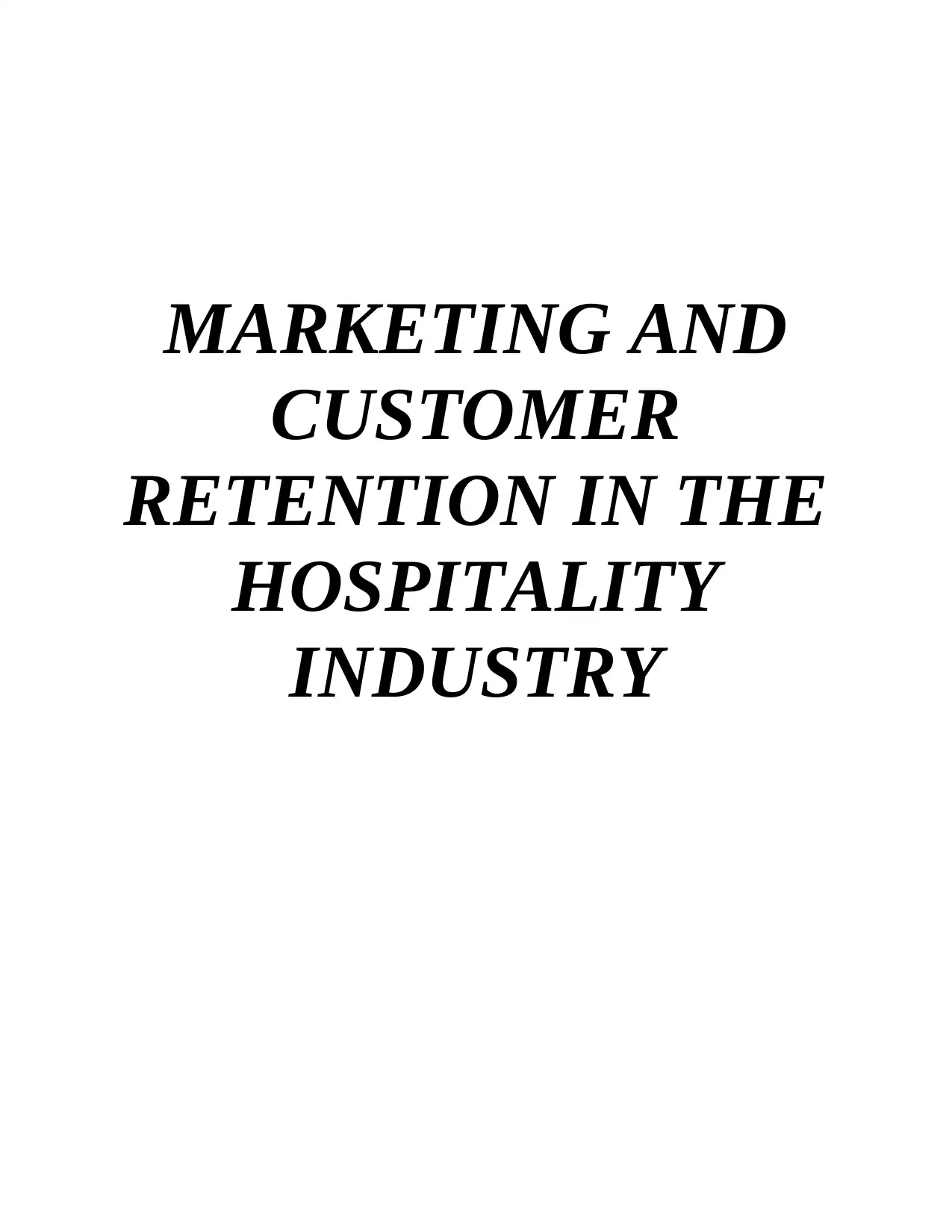
MARKETING AND
CUSTOMER
RETENTION IN THE
HOSPITALITY
INDUSTRY
CUSTOMER
RETENTION IN THE
HOSPITALITY
INDUSTRY
Paraphrase This Document
Need a fresh take? Get an instant paraphrase of this document with our AI Paraphraser
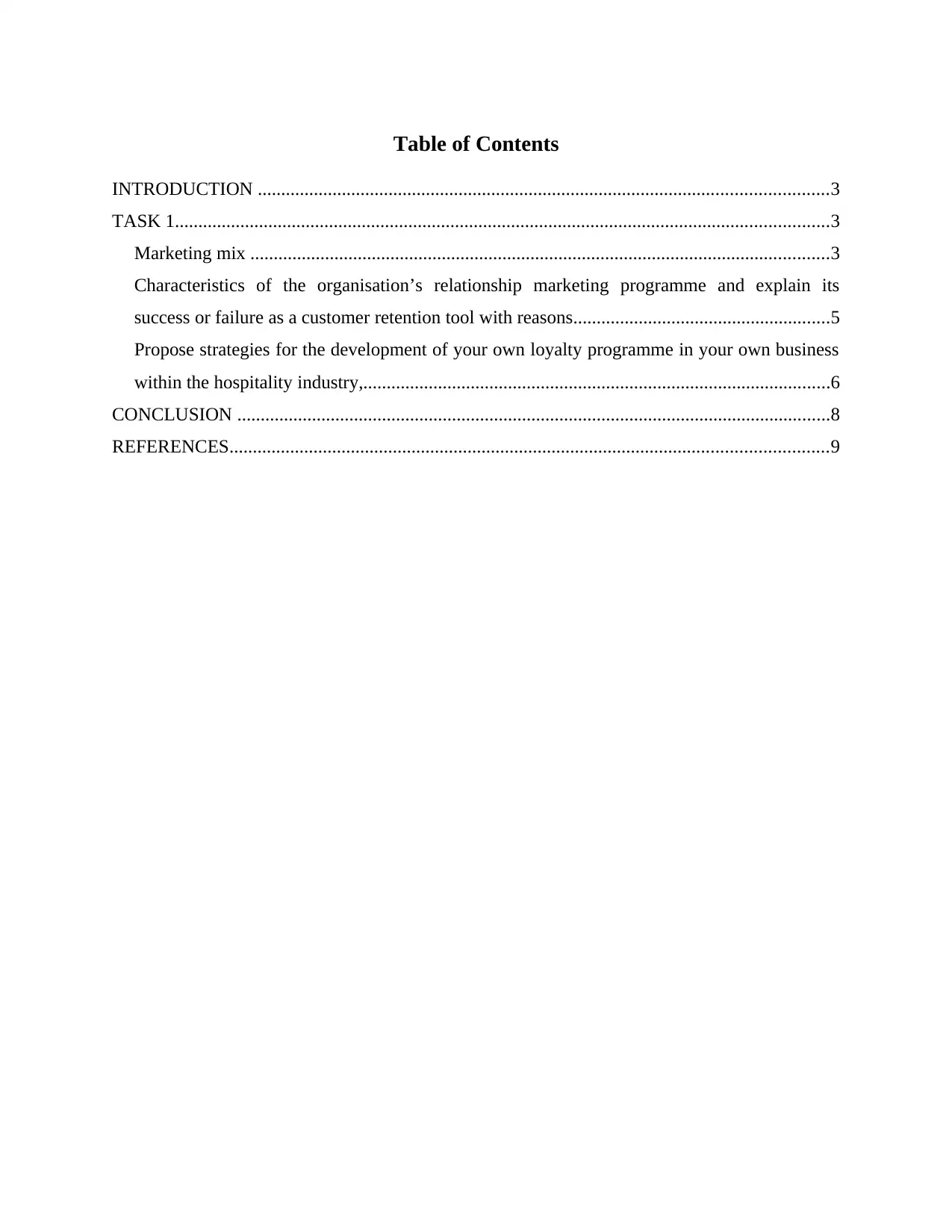
Table of Contents
INTRODUCTION ..........................................................................................................................3
TASK 1............................................................................................................................................3
Marketing mix ............................................................................................................................3
Characteristics of the organisation’s relationship marketing programme and explain its
success or failure as a customer retention tool with reasons.......................................................5
Propose strategies for the development of your own loyalty programme in your own business
within the hospitality industry,....................................................................................................6
CONCLUSION ...............................................................................................................................8
REFERENCES................................................................................................................................9
INTRODUCTION ..........................................................................................................................3
TASK 1............................................................................................................................................3
Marketing mix ............................................................................................................................3
Characteristics of the organisation’s relationship marketing programme and explain its
success or failure as a customer retention tool with reasons.......................................................5
Propose strategies for the development of your own loyalty programme in your own business
within the hospitality industry,....................................................................................................6
CONCLUSION ...............................................................................................................................8
REFERENCES................................................................................................................................9
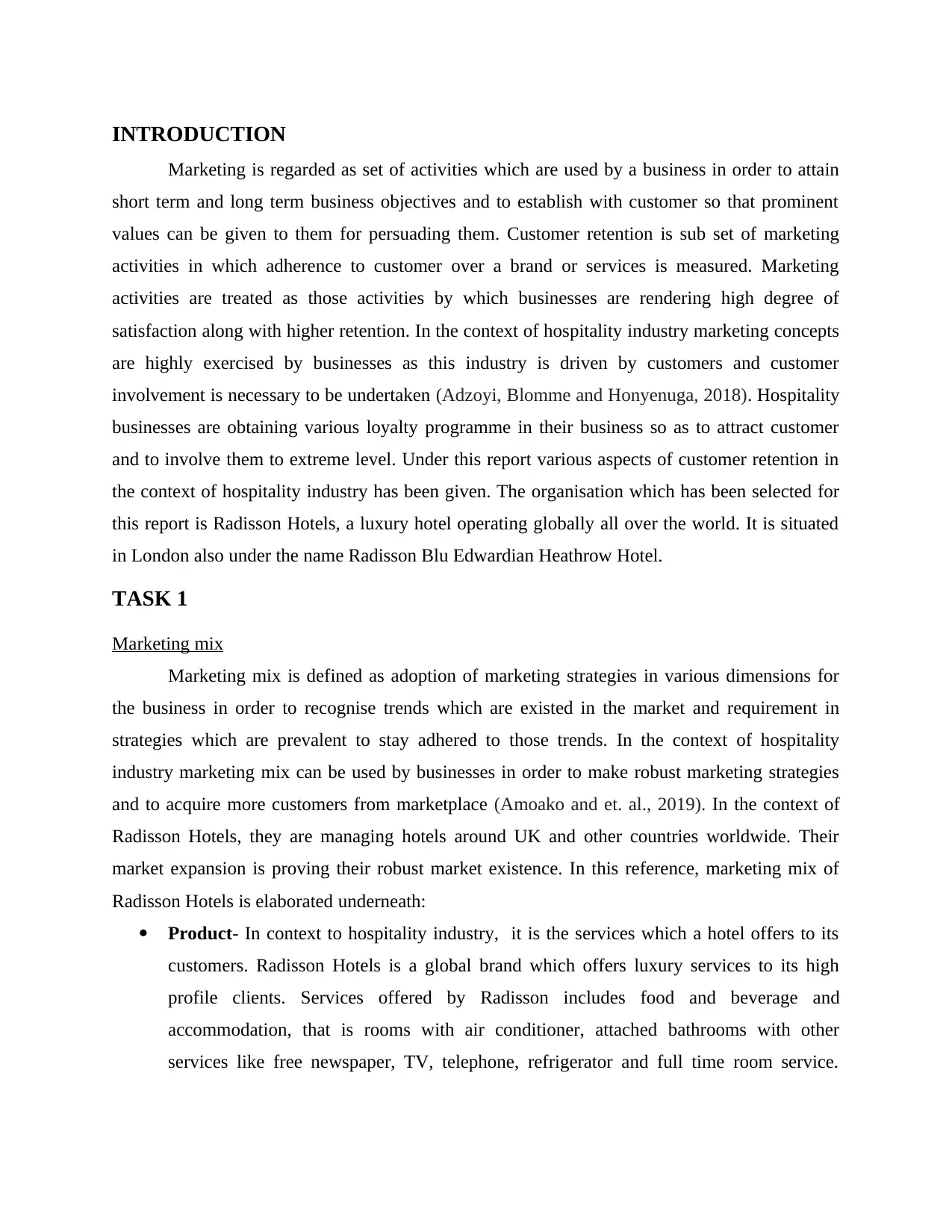
INTRODUCTION
Marketing is regarded as set of activities which are used by a business in order to attain
short term and long term business objectives and to establish with customer so that prominent
values can be given to them for persuading them. Customer retention is sub set of marketing
activities in which adherence to customer over a brand or services is measured. Marketing
activities are treated as those activities by which businesses are rendering high degree of
satisfaction along with higher retention. In the context of hospitality industry marketing concepts
are highly exercised by businesses as this industry is driven by customers and customer
involvement is necessary to be undertaken (Adzoyi, Blomme and Honyenuga, 2018). Hospitality
businesses are obtaining various loyalty programme in their business so as to attract customer
and to involve them to extreme level. Under this report various aspects of customer retention in
the context of hospitality industry has been given. The organisation which has been selected for
this report is Radisson Hotels, a luxury hotel operating globally all over the world. It is situated
in London also under the name Radisson Blu Edwardian Heathrow Hotel.
TASK 1
Marketing mix
Marketing mix is defined as adoption of marketing strategies in various dimensions for
the business in order to recognise trends which are existed in the market and requirement in
strategies which are prevalent to stay adhered to those trends. In the context of hospitality
industry marketing mix can be used by businesses in order to make robust marketing strategies
and to acquire more customers from marketplace (Amoako and et. al., 2019). In the context of
Radisson Hotels, they are managing hotels around UK and other countries worldwide. Their
market expansion is proving their robust market existence. In this reference, marketing mix of
Radisson Hotels is elaborated underneath:
Product- In context to hospitality industry, it is the services which a hotel offers to its
customers. Radisson Hotels is a global brand which offers luxury services to its high
profile clients. Services offered by Radisson includes food and beverage and
accommodation, that is rooms with air conditioner, attached bathrooms with other
services like free newspaper, TV, telephone, refrigerator and full time room service.
Marketing is regarded as set of activities which are used by a business in order to attain
short term and long term business objectives and to establish with customer so that prominent
values can be given to them for persuading them. Customer retention is sub set of marketing
activities in which adherence to customer over a brand or services is measured. Marketing
activities are treated as those activities by which businesses are rendering high degree of
satisfaction along with higher retention. In the context of hospitality industry marketing concepts
are highly exercised by businesses as this industry is driven by customers and customer
involvement is necessary to be undertaken (Adzoyi, Blomme and Honyenuga, 2018). Hospitality
businesses are obtaining various loyalty programme in their business so as to attract customer
and to involve them to extreme level. Under this report various aspects of customer retention in
the context of hospitality industry has been given. The organisation which has been selected for
this report is Radisson Hotels, a luxury hotel operating globally all over the world. It is situated
in London also under the name Radisson Blu Edwardian Heathrow Hotel.
TASK 1
Marketing mix
Marketing mix is defined as adoption of marketing strategies in various dimensions for
the business in order to recognise trends which are existed in the market and requirement in
strategies which are prevalent to stay adhered to those trends. In the context of hospitality
industry marketing mix can be used by businesses in order to make robust marketing strategies
and to acquire more customers from marketplace (Amoako and et. al., 2019). In the context of
Radisson Hotels, they are managing hotels around UK and other countries worldwide. Their
market expansion is proving their robust market existence. In this reference, marketing mix of
Radisson Hotels is elaborated underneath:
Product- In context to hospitality industry, it is the services which a hotel offers to its
customers. Radisson Hotels is a global brand which offers luxury services to its high
profile clients. Services offered by Radisson includes food and beverage and
accommodation, that is rooms with air conditioner, attached bathrooms with other
services like free newspaper, TV, telephone, refrigerator and full time room service.
⊘ This is a preview!⊘
Do you want full access?
Subscribe today to unlock all pages.

Trusted by 1+ million students worldwide
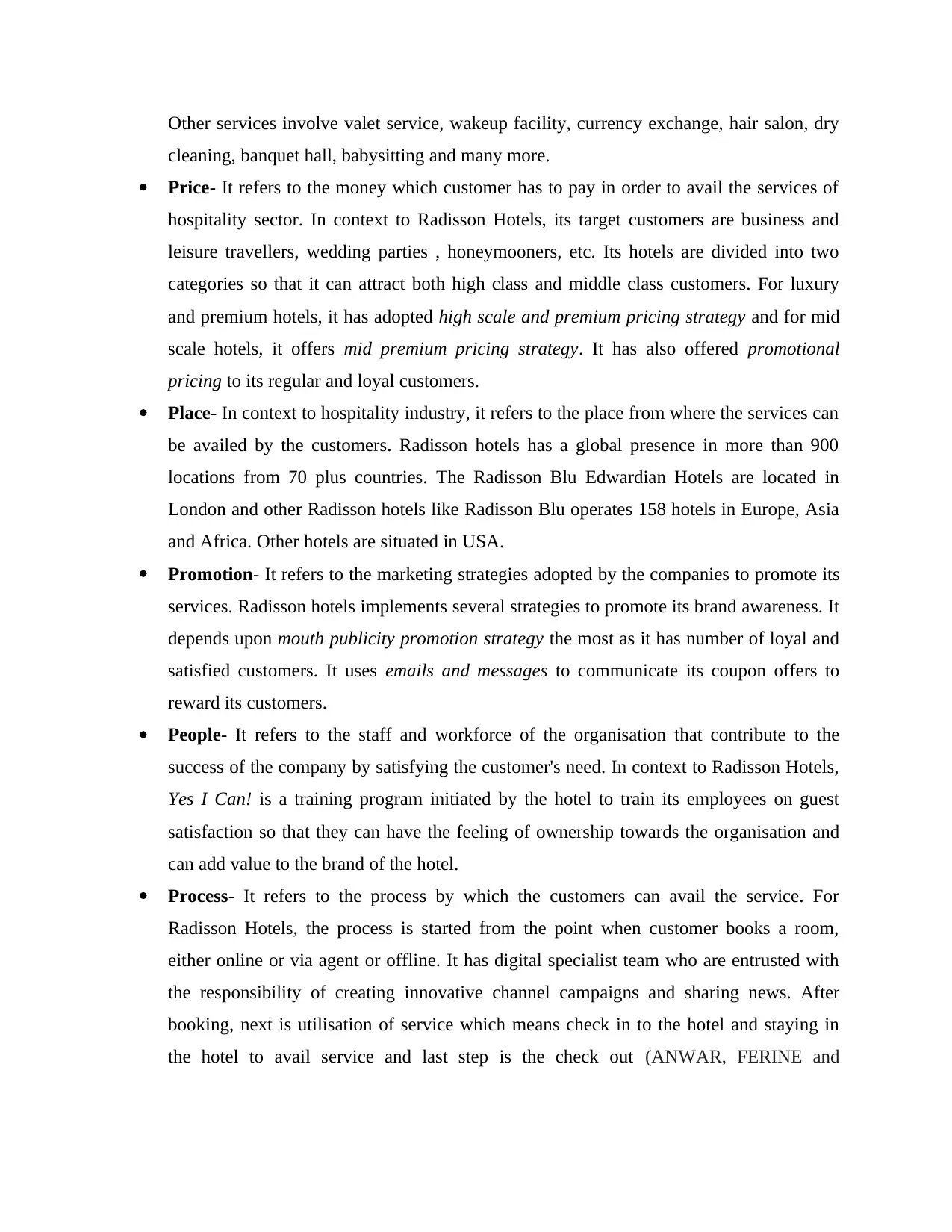
Other services involve valet service, wakeup facility, currency exchange, hair salon, dry
cleaning, banquet hall, babysitting and many more.
Price- It refers to the money which customer has to pay in order to avail the services of
hospitality sector. In context to Radisson Hotels, its target customers are business and
leisure travellers, wedding parties , honeymooners, etc. Its hotels are divided into two
categories so that it can attract both high class and middle class customers. For luxury
and premium hotels, it has adopted high scale and premium pricing strategy and for mid
scale hotels, it offers mid premium pricing strategy. It has also offered promotional
pricing to its regular and loyal customers.
Place- In context to hospitality industry, it refers to the place from where the services can
be availed by the customers. Radisson hotels has a global presence in more than 900
locations from 70 plus countries. The Radisson Blu Edwardian Hotels are located in
London and other Radisson hotels like Radisson Blu operates 158 hotels in Europe, Asia
and Africa. Other hotels are situated in USA.
Promotion- It refers to the marketing strategies adopted by the companies to promote its
services. Radisson hotels implements several strategies to promote its brand awareness. It
depends upon mouth publicity promotion strategy the most as it has number of loyal and
satisfied customers. It uses emails and messages to communicate its coupon offers to
reward its customers.
People- It refers to the staff and workforce of the organisation that contribute to the
success of the company by satisfying the customer's need. In context to Radisson Hotels,
Yes I Can! is a training program initiated by the hotel to train its employees on guest
satisfaction so that they can have the feeling of ownership towards the organisation and
can add value to the brand of the hotel.
Process- It refers to the process by which the customers can avail the service. For
Radisson Hotels, the process is started from the point when customer books a room,
either online or via agent or offline. It has digital specialist team who are entrusted with
the responsibility of creating innovative channel campaigns and sharing news. After
booking, next is utilisation of service which means check in to the hotel and staying in
the hotel to avail service and last step is the check out (ANWAR, FERINE and
cleaning, banquet hall, babysitting and many more.
Price- It refers to the money which customer has to pay in order to avail the services of
hospitality sector. In context to Radisson Hotels, its target customers are business and
leisure travellers, wedding parties , honeymooners, etc. Its hotels are divided into two
categories so that it can attract both high class and middle class customers. For luxury
and premium hotels, it has adopted high scale and premium pricing strategy and for mid
scale hotels, it offers mid premium pricing strategy. It has also offered promotional
pricing to its regular and loyal customers.
Place- In context to hospitality industry, it refers to the place from where the services can
be availed by the customers. Radisson hotels has a global presence in more than 900
locations from 70 plus countries. The Radisson Blu Edwardian Hotels are located in
London and other Radisson hotels like Radisson Blu operates 158 hotels in Europe, Asia
and Africa. Other hotels are situated in USA.
Promotion- It refers to the marketing strategies adopted by the companies to promote its
services. Radisson hotels implements several strategies to promote its brand awareness. It
depends upon mouth publicity promotion strategy the most as it has number of loyal and
satisfied customers. It uses emails and messages to communicate its coupon offers to
reward its customers.
People- It refers to the staff and workforce of the organisation that contribute to the
success of the company by satisfying the customer's need. In context to Radisson Hotels,
Yes I Can! is a training program initiated by the hotel to train its employees on guest
satisfaction so that they can have the feeling of ownership towards the organisation and
can add value to the brand of the hotel.
Process- It refers to the process by which the customers can avail the service. For
Radisson Hotels, the process is started from the point when customer books a room,
either online or via agent or offline. It has digital specialist team who are entrusted with
the responsibility of creating innovative channel campaigns and sharing news. After
booking, next is utilisation of service which means check in to the hotel and staying in
the hotel to avail service and last step is the check out (ANWAR, FERINE and
Paraphrase This Document
Need a fresh take? Get an instant paraphrase of this document with our AI Paraphraser
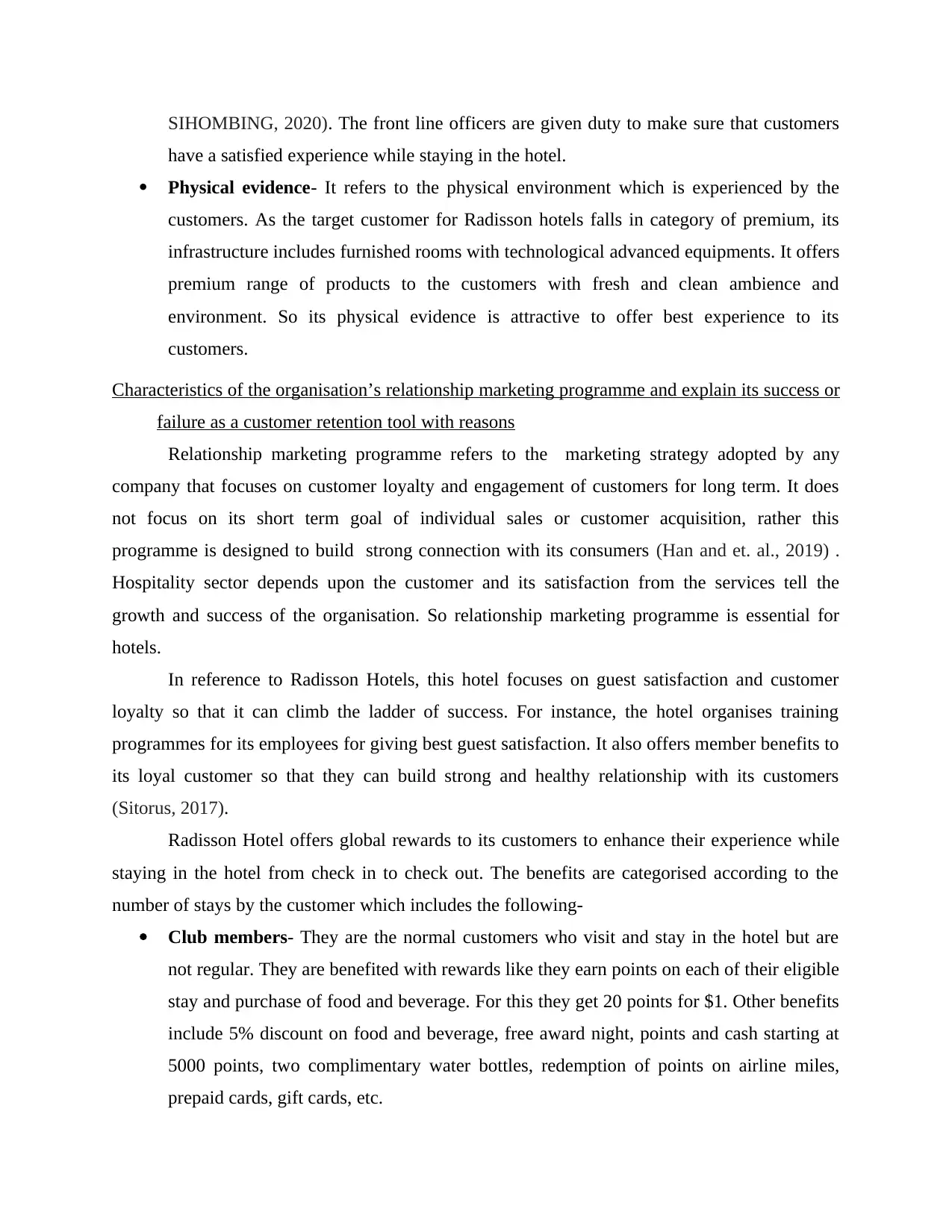
SIHOMBING, 2020). The front line officers are given duty to make sure that customers
have a satisfied experience while staying in the hotel.
Physical evidence- It refers to the physical environment which is experienced by the
customers. As the target customer for Radisson hotels falls in category of premium, its
infrastructure includes furnished rooms with technological advanced equipments. It offers
premium range of products to the customers with fresh and clean ambience and
environment. So its physical evidence is attractive to offer best experience to its
customers.
Characteristics of the organisation’s relationship marketing programme and explain its success or
failure as a customer retention tool with reasons
Relationship marketing programme refers to the marketing strategy adopted by any
company that focuses on customer loyalty and engagement of customers for long term. It does
not focus on its short term goal of individual sales or customer acquisition, rather this
programme is designed to build strong connection with its consumers (Han and et. al., 2019) .
Hospitality sector depends upon the customer and its satisfaction from the services tell the
growth and success of the organisation. So relationship marketing programme is essential for
hotels.
In reference to Radisson Hotels, this hotel focuses on guest satisfaction and customer
loyalty so that it can climb the ladder of success. For instance, the hotel organises training
programmes for its employees for giving best guest satisfaction. It also offers member benefits to
its loyal customer so that they can build strong and healthy relationship with its customers
(Sitorus, 2017).
Radisson Hotel offers global rewards to its customers to enhance their experience while
staying in the hotel from check in to check out. The benefits are categorised according to the
number of stays by the customer which includes the following-
Club members- They are the normal customers who visit and stay in the hotel but are
not regular. They are benefited with rewards like they earn points on each of their eligible
stay and purchase of food and beverage. For this they get 20 points for $1. Other benefits
include 5% discount on food and beverage, free award night, points and cash starting at
5000 points, two complimentary water bottles, redemption of points on airline miles,
prepaid cards, gift cards, etc.
have a satisfied experience while staying in the hotel.
Physical evidence- It refers to the physical environment which is experienced by the
customers. As the target customer for Radisson hotels falls in category of premium, its
infrastructure includes furnished rooms with technological advanced equipments. It offers
premium range of products to the customers with fresh and clean ambience and
environment. So its physical evidence is attractive to offer best experience to its
customers.
Characteristics of the organisation’s relationship marketing programme and explain its success or
failure as a customer retention tool with reasons
Relationship marketing programme refers to the marketing strategy adopted by any
company that focuses on customer loyalty and engagement of customers for long term. It does
not focus on its short term goal of individual sales or customer acquisition, rather this
programme is designed to build strong connection with its consumers (Han and et. al., 2019) .
Hospitality sector depends upon the customer and its satisfaction from the services tell the
growth and success of the organisation. So relationship marketing programme is essential for
hotels.
In reference to Radisson Hotels, this hotel focuses on guest satisfaction and customer
loyalty so that it can climb the ladder of success. For instance, the hotel organises training
programmes for its employees for giving best guest satisfaction. It also offers member benefits to
its loyal customer so that they can build strong and healthy relationship with its customers
(Sitorus, 2017).
Radisson Hotel offers global rewards to its customers to enhance their experience while
staying in the hotel from check in to check out. The benefits are categorised according to the
number of stays by the customer which includes the following-
Club members- They are the normal customers who visit and stay in the hotel but are
not regular. They are benefited with rewards like they earn points on each of their eligible
stay and purchase of food and beverage. For this they get 20 points for $1. Other benefits
include 5% discount on food and beverage, free award night, points and cash starting at
5000 points, two complimentary water bottles, redemption of points on airline miles,
prepaid cards, gift cards, etc.
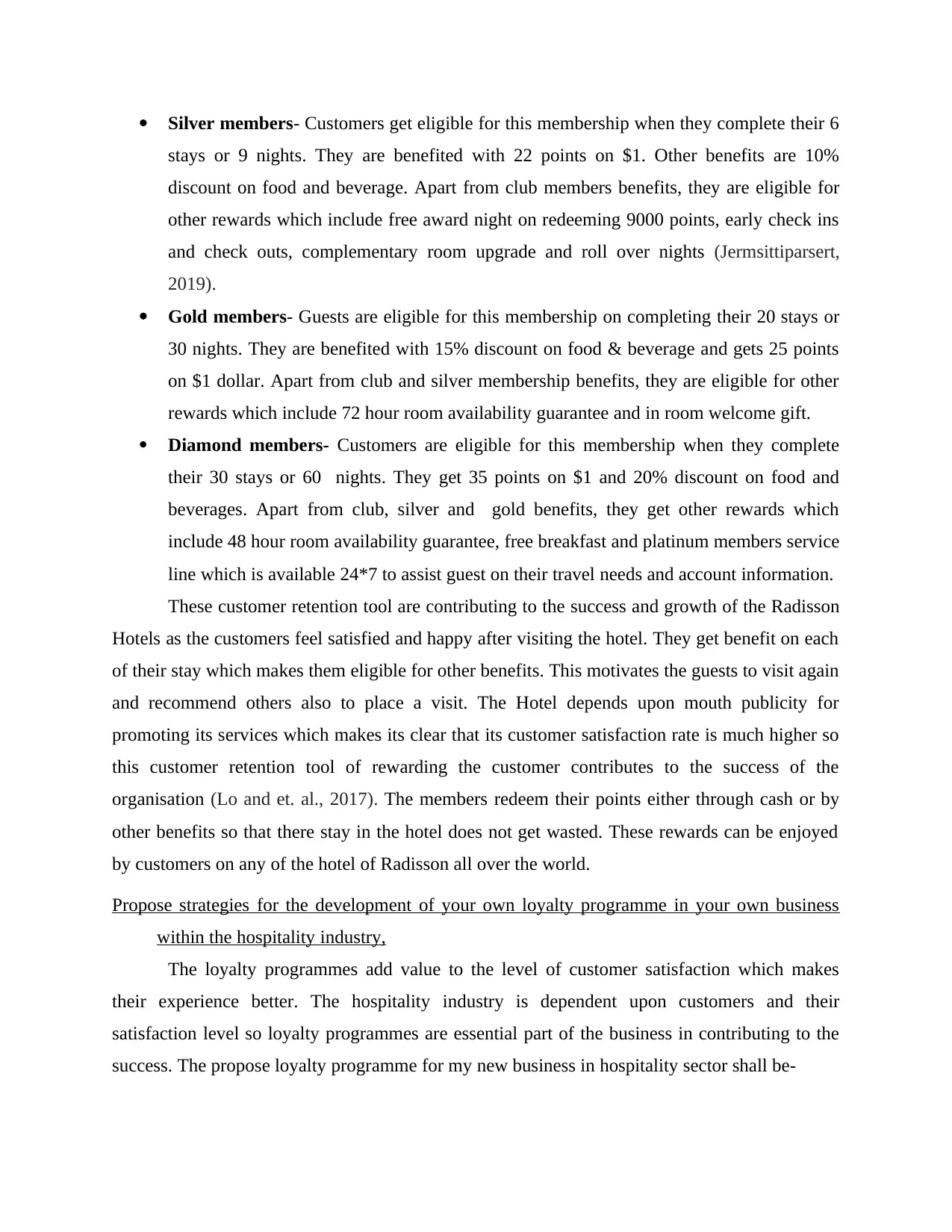
Silver members- Customers get eligible for this membership when they complete their 6
stays or 9 nights. They are benefited with 22 points on $1. Other benefits are 10%
discount on food and beverage. Apart from club members benefits, they are eligible for
other rewards which include free award night on redeeming 9000 points, early check ins
and check outs, complementary room upgrade and roll over nights (Jermsittiparsert,
2019).
Gold members- Guests are eligible for this membership on completing their 20 stays or
30 nights. They are benefited with 15% discount on food & beverage and gets 25 points
on $1 dollar. Apart from club and silver membership benefits, they are eligible for other
rewards which include 72 hour room availability guarantee and in room welcome gift.
Diamond members- Customers are eligible for this membership when they complete
their 30 stays or 60 nights. They get 35 points on $1 and 20% discount on food and
beverages. Apart from club, silver and gold benefits, they get other rewards which
include 48 hour room availability guarantee, free breakfast and platinum members service
line which is available 24*7 to assist guest on their travel needs and account information.
These customer retention tool are contributing to the success and growth of the Radisson
Hotels as the customers feel satisfied and happy after visiting the hotel. They get benefit on each
of their stay which makes them eligible for other benefits. This motivates the guests to visit again
and recommend others also to place a visit. The Hotel depends upon mouth publicity for
promoting its services which makes its clear that its customer satisfaction rate is much higher so
this customer retention tool of rewarding the customer contributes to the success of the
organisation (Lo and et. al., 2017). The members redeem their points either through cash or by
other benefits so that there stay in the hotel does not get wasted. These rewards can be enjoyed
by customers on any of the hotel of Radisson all over the world.
Propose strategies for the development of your own loyalty programme in your own business
within the hospitality industry,
The loyalty programmes add value to the level of customer satisfaction which makes
their experience better. The hospitality industry is dependent upon customers and their
satisfaction level so loyalty programmes are essential part of the business in contributing to the
success. The propose loyalty programme for my new business in hospitality sector shall be-
stays or 9 nights. They are benefited with 22 points on $1. Other benefits are 10%
discount on food and beverage. Apart from club members benefits, they are eligible for
other rewards which include free award night on redeeming 9000 points, early check ins
and check outs, complementary room upgrade and roll over nights (Jermsittiparsert,
2019).
Gold members- Guests are eligible for this membership on completing their 20 stays or
30 nights. They are benefited with 15% discount on food & beverage and gets 25 points
on $1 dollar. Apart from club and silver membership benefits, they are eligible for other
rewards which include 72 hour room availability guarantee and in room welcome gift.
Diamond members- Customers are eligible for this membership when they complete
their 30 stays or 60 nights. They get 35 points on $1 and 20% discount on food and
beverages. Apart from club, silver and gold benefits, they get other rewards which
include 48 hour room availability guarantee, free breakfast and platinum members service
line which is available 24*7 to assist guest on their travel needs and account information.
These customer retention tool are contributing to the success and growth of the Radisson
Hotels as the customers feel satisfied and happy after visiting the hotel. They get benefit on each
of their stay which makes them eligible for other benefits. This motivates the guests to visit again
and recommend others also to place a visit. The Hotel depends upon mouth publicity for
promoting its services which makes its clear that its customer satisfaction rate is much higher so
this customer retention tool of rewarding the customer contributes to the success of the
organisation (Lo and et. al., 2017). The members redeem their points either through cash or by
other benefits so that there stay in the hotel does not get wasted. These rewards can be enjoyed
by customers on any of the hotel of Radisson all over the world.
Propose strategies for the development of your own loyalty programme in your own business
within the hospitality industry,
The loyalty programmes add value to the level of customer satisfaction which makes
their experience better. The hospitality industry is dependent upon customers and their
satisfaction level so loyalty programmes are essential part of the business in contributing to the
success. The propose loyalty programme for my new business in hospitality sector shall be-
⊘ This is a preview!⊘
Do you want full access?
Subscribe today to unlock all pages.

Trusted by 1+ million students worldwide
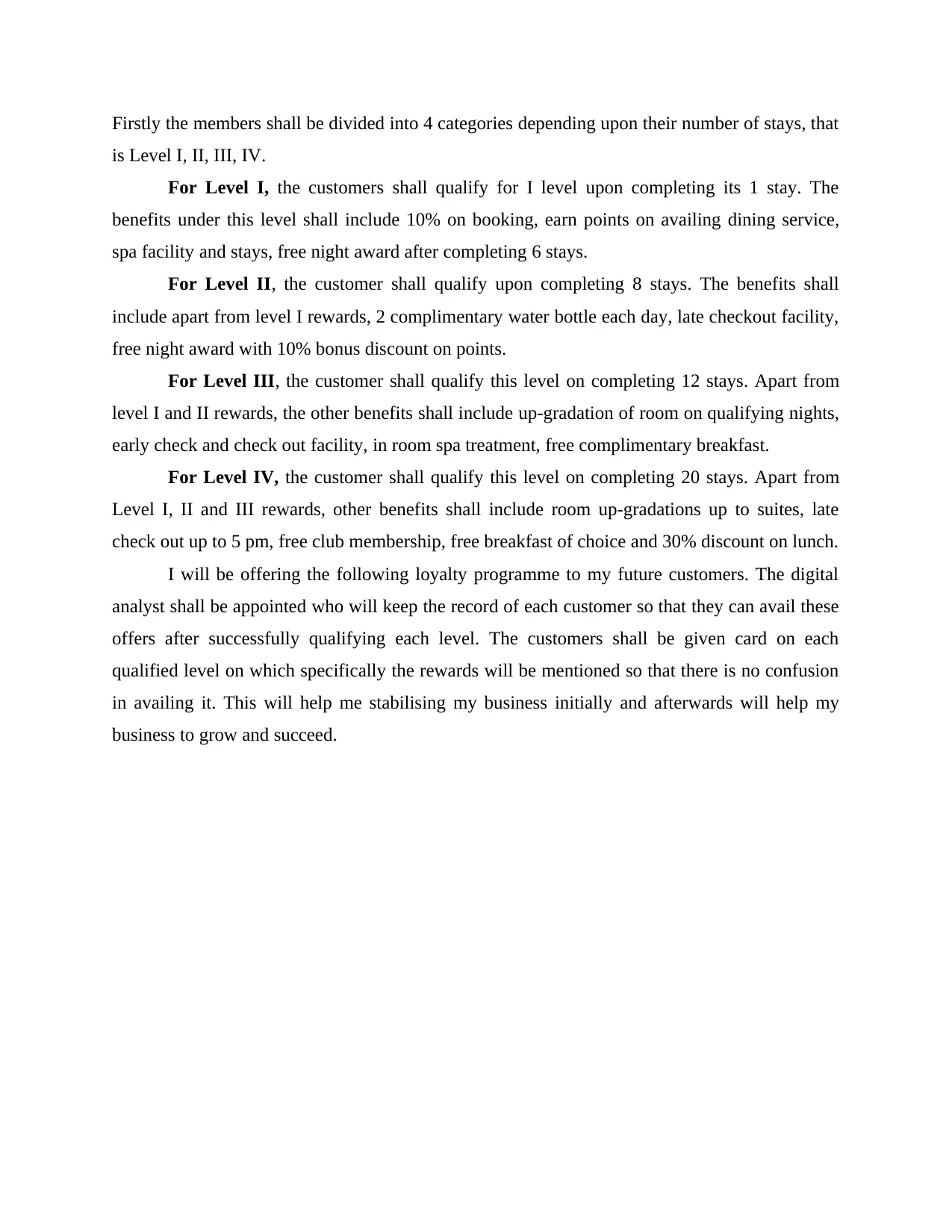
Firstly the members shall be divided into 4 categories depending upon their number of stays, that
is Level I, II, III, IV.
For Level I, the customers shall qualify for I level upon completing its 1 stay. The
benefits under this level shall include 10% on booking, earn points on availing dining service,
spa facility and stays, free night award after completing 6 stays.
For Level II, the customer shall qualify upon completing 8 stays. The benefits shall
include apart from level I rewards, 2 complimentary water bottle each day, late checkout facility,
free night award with 10% bonus discount on points.
For Level III, the customer shall qualify this level on completing 12 stays. Apart from
level I and II rewards, the other benefits shall include up-gradation of room on qualifying nights,
early check and check out facility, in room spa treatment, free complimentary breakfast.
For Level IV, the customer shall qualify this level on completing 20 stays. Apart from
Level I, II and III rewards, other benefits shall include room up-gradations up to suites, late
check out up to 5 pm, free club membership, free breakfast of choice and 30% discount on lunch.
I will be offering the following loyalty programme to my future customers. The digital
analyst shall be appointed who will keep the record of each customer so that they can avail these
offers after successfully qualifying each level. The customers shall be given card on each
qualified level on which specifically the rewards will be mentioned so that there is no confusion
in availing it. This will help me stabilising my business initially and afterwards will help my
business to grow and succeed.
is Level I, II, III, IV.
For Level I, the customers shall qualify for I level upon completing its 1 stay. The
benefits under this level shall include 10% on booking, earn points on availing dining service,
spa facility and stays, free night award after completing 6 stays.
For Level II, the customer shall qualify upon completing 8 stays. The benefits shall
include apart from level I rewards, 2 complimentary water bottle each day, late checkout facility,
free night award with 10% bonus discount on points.
For Level III, the customer shall qualify this level on completing 12 stays. Apart from
level I and II rewards, the other benefits shall include up-gradation of room on qualifying nights,
early check and check out facility, in room spa treatment, free complimentary breakfast.
For Level IV, the customer shall qualify this level on completing 20 stays. Apart from
Level I, II and III rewards, other benefits shall include room up-gradations up to suites, late
check out up to 5 pm, free club membership, free breakfast of choice and 30% discount on lunch.
I will be offering the following loyalty programme to my future customers. The digital
analyst shall be appointed who will keep the record of each customer so that they can avail these
offers after successfully qualifying each level. The customers shall be given card on each
qualified level on which specifically the rewards will be mentioned so that there is no confusion
in availing it. This will help me stabilising my business initially and afterwards will help my
business to grow and succeed.
Paraphrase This Document
Need a fresh take? Get an instant paraphrase of this document with our AI Paraphraser
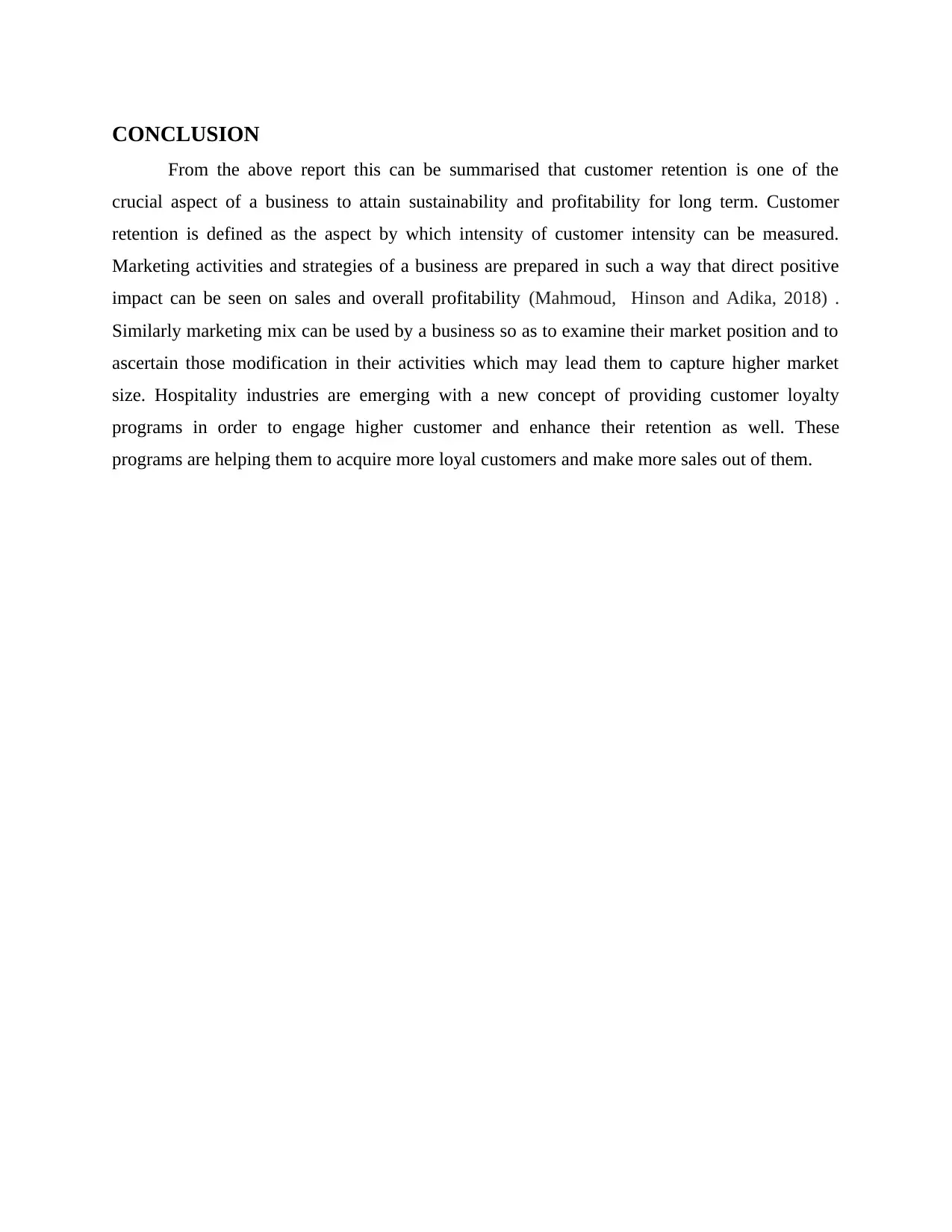
CONCLUSION
From the above report this can be summarised that customer retention is one of the
crucial aspect of a business to attain sustainability and profitability for long term. Customer
retention is defined as the aspect by which intensity of customer intensity can be measured.
Marketing activities and strategies of a business are prepared in such a way that direct positive
impact can be seen on sales and overall profitability (Mahmoud, Hinson and Adika, 2018) .
Similarly marketing mix can be used by a business so as to examine their market position and to
ascertain those modification in their activities which may lead them to capture higher market
size. Hospitality industries are emerging with a new concept of providing customer loyalty
programs in order to engage higher customer and enhance their retention as well. These
programs are helping them to acquire more loyal customers and make more sales out of them.
From the above report this can be summarised that customer retention is one of the
crucial aspect of a business to attain sustainability and profitability for long term. Customer
retention is defined as the aspect by which intensity of customer intensity can be measured.
Marketing activities and strategies of a business are prepared in such a way that direct positive
impact can be seen on sales and overall profitability (Mahmoud, Hinson and Adika, 2018) .
Similarly marketing mix can be used by a business so as to examine their market position and to
ascertain those modification in their activities which may lead them to capture higher market
size. Hospitality industries are emerging with a new concept of providing customer loyalty
programs in order to engage higher customer and enhance their retention as well. These
programs are helping them to acquire more loyal customers and make more sales out of them.
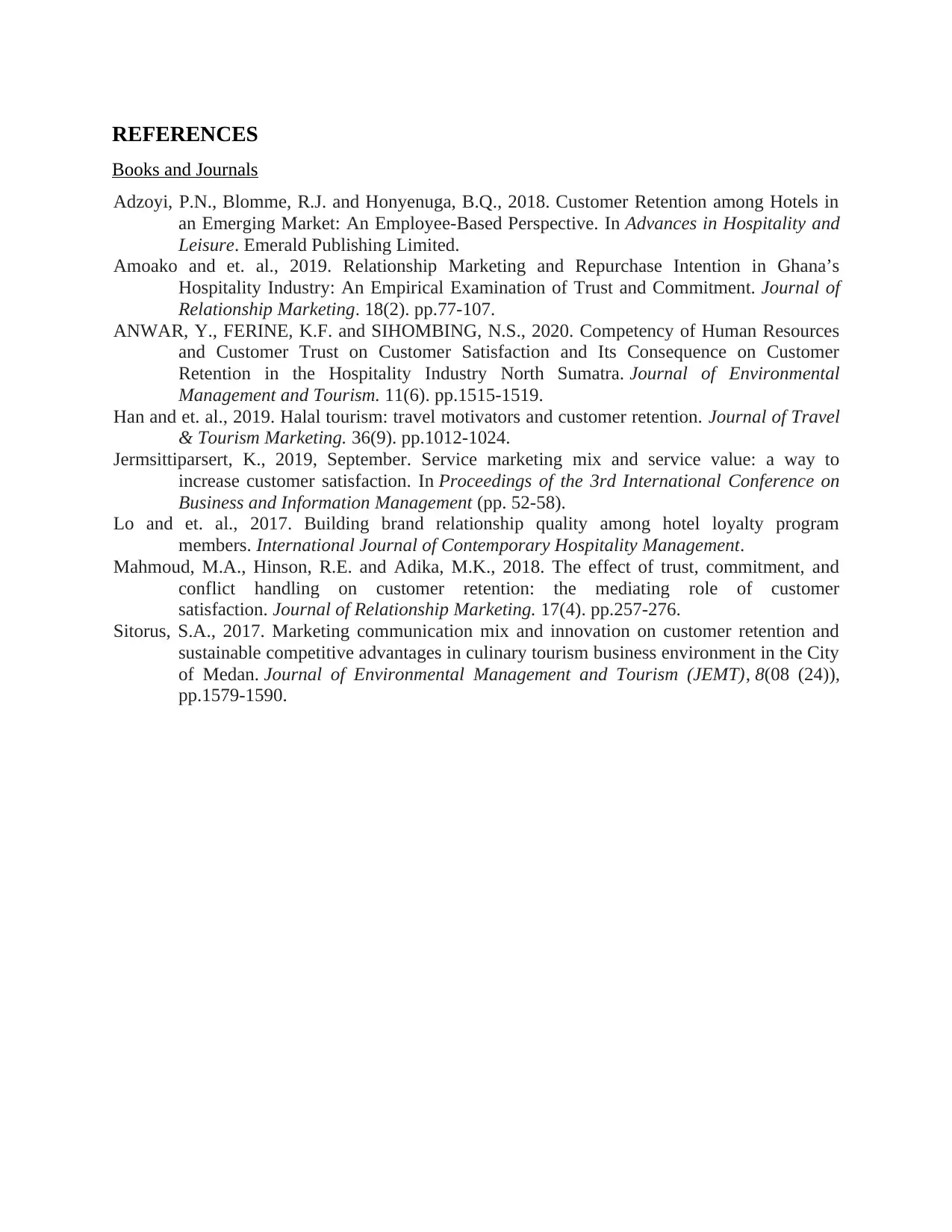
REFERENCES
Books and Journals
Adzoyi, P.N., Blomme, R.J. and Honyenuga, B.Q., 2018. Customer Retention among Hotels in
an Emerging Market: An Employee-Based Perspective. In Advances in Hospitality and
Leisure. Emerald Publishing Limited.
Amoako and et. al., 2019. Relationship Marketing and Repurchase Intention in Ghana’s
Hospitality Industry: An Empirical Examination of Trust and Commitment. Journal of
Relationship Marketing. 18(2). pp.77-107.
ANWAR, Y., FERINE, K.F. and SIHOMBING, N.S., 2020. Competency of Human Resources
and Customer Trust on Customer Satisfaction and Its Consequence on Customer
Retention in the Hospitality Industry North Sumatra. Journal of Environmental
Management and Tourism. 11(6). pp.1515-1519.
Han and et. al., 2019. Halal tourism: travel motivators and customer retention. Journal of Travel
& Tourism Marketing. 36(9). pp.1012-1024.
Jermsittiparsert, K., 2019, September. Service marketing mix and service value: a way to
increase customer satisfaction. In Proceedings of the 3rd International Conference on
Business and Information Management (pp. 52-58).
Lo and et. al., 2017. Building brand relationship quality among hotel loyalty program
members. International Journal of Contemporary Hospitality Management.
Mahmoud, M.A., Hinson, R.E. and Adika, M.K., 2018. The effect of trust, commitment, and
conflict handling on customer retention: the mediating role of customer
satisfaction. Journal of Relationship Marketing. 17(4). pp.257-276.
Sitorus, S.A., 2017. Marketing communication mix and innovation on customer retention and
sustainable competitive advantages in culinary tourism business environment in the City
of Medan. Journal of Environmental Management and Tourism (JEMT), 8(08 (24)),
pp.1579-1590.
Books and Journals
Adzoyi, P.N., Blomme, R.J. and Honyenuga, B.Q., 2018. Customer Retention among Hotels in
an Emerging Market: An Employee-Based Perspective. In Advances in Hospitality and
Leisure. Emerald Publishing Limited.
Amoako and et. al., 2019. Relationship Marketing and Repurchase Intention in Ghana’s
Hospitality Industry: An Empirical Examination of Trust and Commitment. Journal of
Relationship Marketing. 18(2). pp.77-107.
ANWAR, Y., FERINE, K.F. and SIHOMBING, N.S., 2020. Competency of Human Resources
and Customer Trust on Customer Satisfaction and Its Consequence on Customer
Retention in the Hospitality Industry North Sumatra. Journal of Environmental
Management and Tourism. 11(6). pp.1515-1519.
Han and et. al., 2019. Halal tourism: travel motivators and customer retention. Journal of Travel
& Tourism Marketing. 36(9). pp.1012-1024.
Jermsittiparsert, K., 2019, September. Service marketing mix and service value: a way to
increase customer satisfaction. In Proceedings of the 3rd International Conference on
Business and Information Management (pp. 52-58).
Lo and et. al., 2017. Building brand relationship quality among hotel loyalty program
members. International Journal of Contemporary Hospitality Management.
Mahmoud, M.A., Hinson, R.E. and Adika, M.K., 2018. The effect of trust, commitment, and
conflict handling on customer retention: the mediating role of customer
satisfaction. Journal of Relationship Marketing. 17(4). pp.257-276.
Sitorus, S.A., 2017. Marketing communication mix and innovation on customer retention and
sustainable competitive advantages in culinary tourism business environment in the City
of Medan. Journal of Environmental Management and Tourism (JEMT), 8(08 (24)),
pp.1579-1590.
⊘ This is a preview!⊘
Do you want full access?
Subscribe today to unlock all pages.

Trusted by 1+ million students worldwide
1 out of 9
Related Documents
Your All-in-One AI-Powered Toolkit for Academic Success.
+13062052269
info@desklib.com
Available 24*7 on WhatsApp / Email
![[object Object]](/_next/static/media/star-bottom.7253800d.svg)
Unlock your academic potential
Copyright © 2020–2025 A2Z Services. All Rights Reserved. Developed and managed by ZUCOL.




